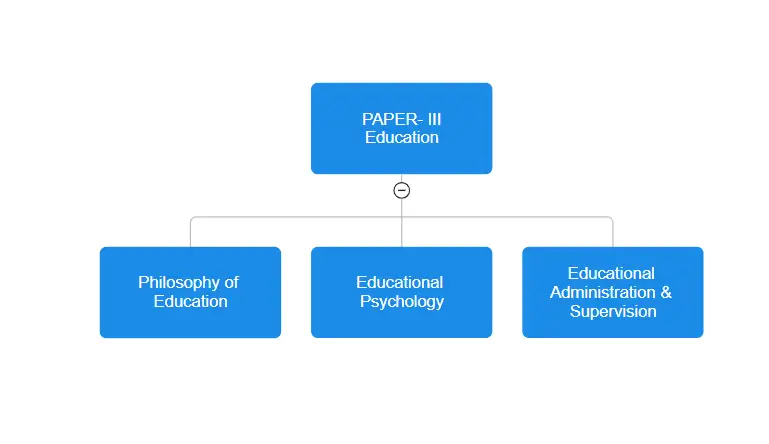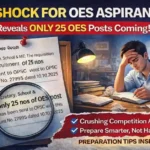Odisha Education Service (OES): The Odisha Education Service (School Branch) exam is conducted by the Odisha Public Service Commission (OPSC) and as per source OES notification is going to publish very soon in the second half of 2025. So a good and holistic preparation is going to be the key for the success in the journey of a respectable position in the society as a OES officer. So your road map to success will start from the syllabus. Below is the detailed and officially prescribed syllabus for each paper, presented in a clear and organized format.
This exam has:
Three written papers
One viva-voce (interview)
OES 2025 – Exam Pattern
| Paper | Subject | Marks |
|---|---|---|
| Paper I | General English | 100 |
| Paper II | General Knowledge | 100 |
| Paper III | Education (Subject Paper) | 150 |
| Viva Voce (Interview) | Personality Test | 150 |
PAPER I – GENERAL ENGLISH (100 Marks)
- This paper will be of graduate degree standard carrying maximum mark of 100, which include 50 mark essay.
- This paper will test candidates’ command over the English language, including their writing and comprehension skills.
Syllabus consists of –
Essay Writing
Precis Writing
Comprehension
Vocabulary
Usage and Grammar
PAPER II – GENERAL KNOWLEDGE (100 Marks)
- This paper will test the candidates knowledge of matters including current events and general knowledge.
- This paper will carry maximum of 100 marks in MCQ format only.
Syllabus-
Indian History and Culture
Indian Polity
Indian Economy
Geography of India and Odisha
Current National and International Events
Odisha’s History, Culture, Economy, and Governance
Important Government Schemes and Policies (especially related to Education)
PAPER III – EDUCATION (150 Marks)
- This paper on education will be of Post-Graduate Standard Carrying maximum mark of 150.
- All the questions will be on MCQ format.
It is divided into three main sections as below:

Section A: Philosophy of Education
Contemporary Western & Indian Educational Thought
Western thinkers: John Dewey, Jean-Jacques Rousseau.
Indian thinkers: Mahatma Gandhi, Rabindranath Tagore, Vivekananda etc.
Education & Society
Role of education in socialization, modernization, and cultural preservation.
Social control, social change, and determinants of culture.
Section B: Educational Psychology
(a) Learning
(i) Nature and scope of learning
(ii) Theories of learning and laws of learning
(iii) Transfer and training
(iv) Motivation, functional autonomy of motives
(b) Individual differences
(i) Differences due to heredity & environment
(ii) Types and extent of individual differences
(iii) Educational provision for individual differences
(c) Intelligence – It’s nature and measurement, special abilities and their measurements and their administration.
(d) Personality and its measurement
(i) Definitions
(ii) Traits of personality
(iii) Measurement of personality
(e) Adjustment
(i) Mental health and adjustment
(ii) Conflict, frustrations and complexes
(iii) Defence mechanisms
(iv) Behaviour problems in schools
(v) Teacher’s mental health
Section C: Educational Administration & Supervision
(a) Principles
(i) Scope of educational administration and the factors determining it.
(ii) Principles of educational administration in a democracy.
(b) Educational control and management
(i) Educational authorities, Central, State and Local, their organization, Powers & functions.
(ii) Important central agencies such as U.G.C., N.C.E.R.T., All India Council for Technical Education.
(c) Supervision
(i) Concept, scope and principles
(ii) Objectives
(iii) Planning and Organization
(iv) Techniques
(d) Educational Finance
(i) Concept, scope and principles
(ii) Sources of income, Central, State, Local & Private
(iii) Grant-in-aid
(iv) Educational expenditure
(e) Planning, organization and research
(i) Five year plans
(ii) Equality of educational opportunity
(iii) Educational or handicapped children
(iv) Research in educational administration
OES Exam Viva Voce (Interview) – 150 Marks
Candidates who qualify the written examination are called for the Viva Voce Test, where they are assessed on:
Personality and attitude
Communication skills
Depth of knowledge in education
General awareness
Understanding of Odisha’s education system
Understanding the official OES syllabus is the first step to success in the OES exam. So your first step for the preparation of OES Exam is to download this OES syllabus and align your study according to this syllabus .
Download the official OES Syllabus – Click here
Stay connected with us at LearnOdisha.com – your learning partner for all OES-related guidance!










